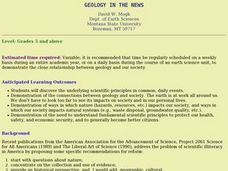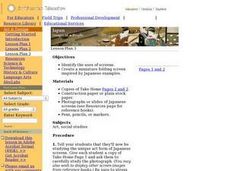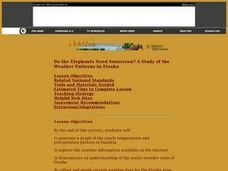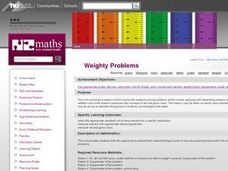Curated OER
Now Take a Deep Breath
Students research to answer questions related to deep sea diving. In this deep sea diving lesson, students answer questions on a worksheet using the Internet. They discuss pressure, gas laws, and the physiology of diving in the deep sea.
Curated OER
Reading Comprehension: Oceans
In this ocean comprehension worksheet, students read a short passage, then complete 4 short answer questions about oceans. Worksheet contains a link to additional activities.
Curated OER
Geology in the News
Students discover the underlying scientific principles in common, daily events.
Curated OER
Air Masses
Students examine the physical characteristics of several types of air masses to discover how air masses can be identified and defined by their temperature and moisture content.
Curated OER
Carbon Dioxide: The Heat is On
Students examine the greenhouse gases affecting the atmosphere. In groups, they participate in activities in which they examine the effects of heat on the atmosphere and phytoplankton. They research how the phytoplankton differ in warm...
Curated OER
BOUNCING INFORMATION AROUND
Students examine how satellite signals are sent and duplicate it with a mirror, flashlight and black paper.
Curated OER
Robots from Junk
Students create balloon and rubber band models of robotic rovers to investigate the concepts of mass, torque, and friction. Through research and planning, students construct a rover test-bed that simulates the Martian environment.
Curated OER
Investigating Erosion in an Outdoor Classroom
First graders observe the effects of erosion. They work in groups to simulate erosion in a streambed, participate in class discussion, read books about fossils and rocks and then go on a fossil hunt.
Curated OER
A Sense of Location: The Mental Map
Students consider the ways a mental maps of geographic landmarks can help migrating animals stay on the correct course.
Curated OER
Flood Control Project
Students examine the reasons why dams were built in Nebraska. They identify factors that need to be considered when building a dam. They create a dam of their own.
Curated OER
Japan: Images of a People
Students learn the geography of Japan and its location in reference to the United States.
Curated OER
Do the Elephants Need Sunscreen? A Study of the Weather Patterns in Etosha
Students analyze the weather patterns in Namibia. They create a graph of the yearly temperatures and use the internet to gather information. They discuss how the weather goes in cycles in the area.
Curated OER
Mass: Applying and Interpreting
Learners rotate through six studying stations solving problems that involve applying and interpreting aspects of mass. They solve various word problems, and measure the contents of cans and calculate the mass of two cans.
Curated OER
Playground Zoom
Students observe and draw small objects on the playground or in the classroom with and without a magnifying glass. They explore how lenses can affect the way that an object is observed from afar or remotely sensed. Afterwards, they share...
Annenberg Foundation
Annenberg Learner: Planet Earth
A series of seven instructional, hour-long videos presenting Earth-science topics such as plate tectonics, oceans, climate changes, natural resources, the Sun, and the future of our planet. Closed captioning option provided for each video.
Science Education Resource Center at Carleton College
Serc: Earth System Science
Students learn to identify the parts of the Earth system and the processes that connect them. They look for interconnections among components of the Earth system at the local level, using a study site close to their school.

















